Bicycles, motorcycles to join thousands of talking cars operating in northeast Ann Arbor
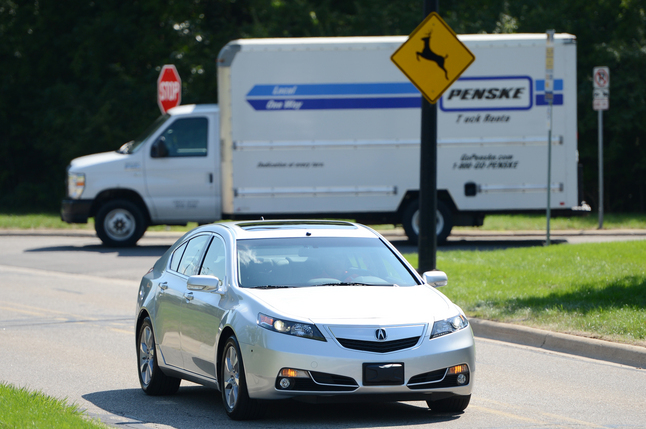
A vehicle equipped with Wi-Fi-like technology drives through a scenario at the University of Michigan Transportation Research Institute in Ann Arbor, Mich. on August 20, 2012.
Melanie Maxwell I AnnArbor.com
Right now roughly 2,000 cars and another 400 trucks and service vehicles are equipped with vehicle-to-vehicle wireless communication devices —dubbed V2V technology,— along with several intersections, curved roads and highway sites.
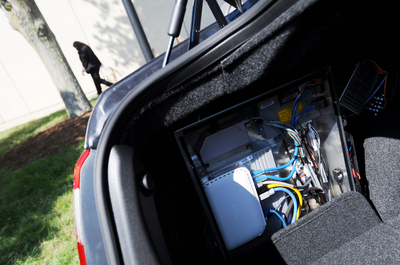
V2V wireless devices installed in a car participating in the study.
The cars have the ability to interact with one another and with devices on roadways so drivers are alerted of safety threats, traffic issues and suggested route changes due to the two.
The vehicles are part of an $18 million real-world deployment of still-developing wireless technology on the roadway. Researchers at the University of Michigan Transportation Research Institute and officials at U.S. Department of Transportation are collecting data from the study to determine if the technology is reliable and effective at reducing collisions.
Starting in January UMTRI will begin deploying bicycles equipped with wireless technology, and in the spring the institute will deploy V2V motorcycles.
Researchers are looking to deploy at least 12 motorcycles and about three bicycles.
The study launched in August.
More volunteers needed
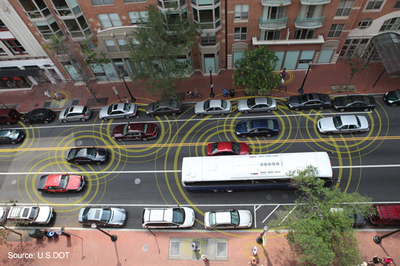
Researchers say connected vehicles can help to mitigate crashes on busy urban streets.
USDOT photo
Researchers are looking to sign up another 400 volunteers willing to equip their car with the technology by the end of November.
Although 4,000 people signed up to volunteer, only 2,000 followed through or were eligible for the study. Deployment manager Jim Sayer said that many who signed up didn't want to deal with the time commitment required, which is roughly three hours spread over the course of nearly a year.
To volunteer, drivers need to frequent the northeast Ann Arbor area. The commitment requires five visits to UMTRI's headquarters at the North Campus Research Complex —one 75-minute visit for installation, three 10-minute visits for data transfer and another visit to extract the device at the end of the study.
Volunteers get $200, which they can pocket or donate to Ann Arbor Public Schools or the Mott Children's Hospital.
If UMTRI doesn't enroll another 400 vehicles, "we will fail to met our sponsor's objectives," said Sayer. USDOT, the project's sponsor, is looking to the deployment as officials consider requiring V2V systems in future vehicles.
Sayer says thus far the V2V-equipped vehicles and infrastructure have been working as expected, alerting drivers of nearby vehicles and safety threats.
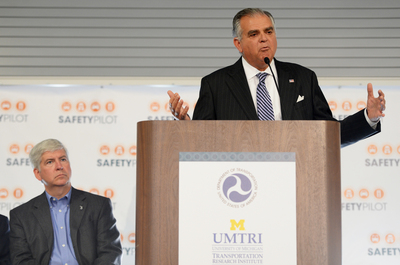
U.S. Secretary of Transportation Ray LaHood speaks as Michigan Gov. Rick Snyder looks on at the launch of a vehicle-to-vehicle communication project in Ann Arbor in August.
Melanie Maxwell | AnnArbor.com
"We've got all of the infrastructure in place, everything is working well. We just need some more personal vehicles," he said.
Ann Arbor becoming hub for V2V research?
When DOT tapped U-M to run the model deployment —UMTRI bid against a number of other prominent research universities for the multimillion research grant— Kirk T. Steudle, director of the Michigan Department of Transportation, predicted that other companies would come to Ann Arbor to test their own wireless technologies, making the area a hub for V2V innovation.
"This area becomes the epicenter of connected vehicle research," he said at the time.
U-M Vice President for Research Stephen Forrest said the Ann Arbor-area had the potential to become the next Silicon Valley.
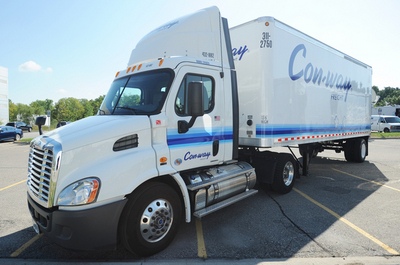
A truck equipped with V2V technology.
"I see our region as poised to be the next really substantial, integrated, industrial core of this nation," Forrest told AnnArbor.com in October.
Sayer said companies are already coming to Ann Arbor to test their devices within the deployment area.
Thus far at least three automobile makers have tested their vehicles in northeast Ann Arbor. Although these vehicles aren't officially related to the study, their V2V technology communicates with the infrastructure and 2,400 vehicles that are currently a part of the study.
Sayer declined to say which auto companies are testing their technology in Ann Arbor.
A handful of telecommunications companies have also approached Sayer about incorporating their technology into the study. These companies are interested in integrating applications that can work on the existing V2V infrastructure and the everyday mobile devices that people already carry with them.
No companies, however, have set up offices in Ann Arbor.
"We want to try to generate business and attract people to this part of Washtenaw County to do this kind of work, and we're having some success," said Sayer. "People aren't moving businesses here yet, but they're at least coming to utilize the facility."
Kellie Woodhouse covers higher education for AnnArbor.com. Reach her at kelliewoodhouse@annarbor.com or 734-623-4602 and follow her on twitter.


Comments
LXIX
Mon, Nov 12, 2012 : 1:43 p.m.
Ann Arbor is an intelligent community. Most people here know or suspect their personal internet information (their location, sites visited, tracked details like page views, time spent, links clicked, etc) equates to tailored experience for them and a targeted profit for others. People know how key words used in private gmail or for websearchs are turned into ads blasted back at them. Now contribute your correlated driving information. Where you went, when. What you did there - enter a door use a CC a cellphone a tablet? Did you get an e-ticket for speeding? E-questioned for being near a crimescene or accident? Take lunch on company time? What people/places is your vehicle frequently associated with? Ann Arborites also understand that most e-communication over cell phones or navigation using gps is anything but 'lightspeed' to them because of signal variance and processing time. Advanced research often leads to new and more valuable products and services so the smartcar is great business for this cutting-edge R&D town. Will smart car interneting control vehicles and prevent accidents? Will it be mandatory like seatbelts? Since 9/11 the NSA has been designing/constructing a multi-billion dollar communications processing complex in Utah. It's goal is to screen and process every US based conversation for "foreign threat" patterns (wired.com). That would presumably include your smart car talking.
StopCrying
Mon, Nov 12, 2012 : 3:29 p.m.
Not a terrorist, don't care. I want my car to chauffeur me so I can get hammered.
Chris
Mon, Nov 12, 2012 : 2:27 p.m.
I, for one, welcome our new digital overlords.
beardown
Mon, Nov 12, 2012 : 1:40 p.m.
I wonder if there are plans to move this into the downtown area, as well as areas with more traffic? It would be interesting to see what these systems can do with the goofy downtown traffic we have here (students jumping out in front of you, double parking, general mayhem from 7am to 8pm).
timjbd
Mon, Nov 12, 2012 : 11:53 a.m.
Car: Who you gonna believe? Me, or your own lyin eyes? Floor it.
palebluedot
Mon, Nov 12, 2012 : 4:59 a.m.
I want to participate, but I live in the City of Detroit. How can I volunteer?
Chris
Mon, Nov 12, 2012 : 2:26 p.m.
Start driving to Northeast Ann Arbor every day.
A2comments
Mon, Nov 12, 2012 : 1:06 p.m.
If you don't drive your car in the Northeast sector of Ann Arbor, roughly bounded by Plymouth and Geddes Road, then you can't participate. That's the driving area that is included in the test.
A2comments
Sun, Nov 11, 2012 : 10:35 p.m.
We are in the pilot. I'd urge those that drive in northeast A2 (Plymouth Rd down to Geddes) to sign up.